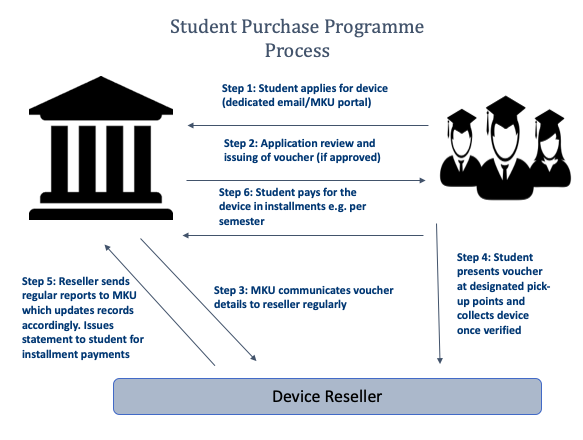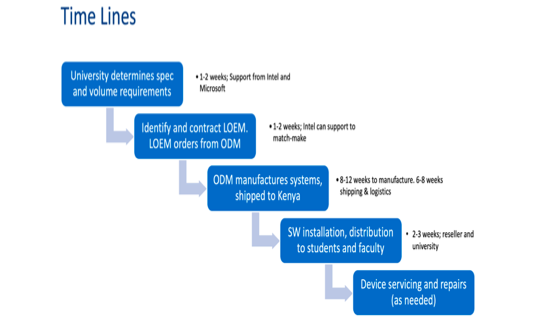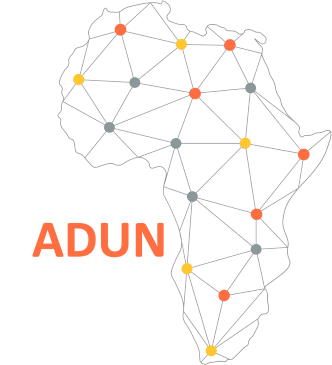ADUN
Mount Kenya University
Mount Kenya University Students Migration to Digital Learning
PREAMBLE
A task force constituted by the Vice Chancellor have been engaging Intel device manufacturer and Microsoft on the possibility of partnering to provide devices to the students. A survey done by KENET on E readiness indicated that more than 52% of students in Universities in Kenya do not have laptops that translate to more than 22,000 students in MKU and more than 250,000 university students in the country. This shows that there is relatively low laptop ownership by students and universities must find a way of overcoming this challenge.
During COVID-19 Crisis, Institutions of higher learning are moving to Fully Online Delivery from Traditional Face-to-Face Courses (not including institutions already fully online).
ANTICIPATED CHALLENGES DURING TRANSITION
Technology:
-
- Lack of access to devices
- Inability to access and afford (quality) connectivity
- Difficulty using LMS and collaboration platforms (short-term)
Faculty transition to online teaching :
- Resistance to online learning, fear of losing relevance
- Inability to engage with students
Students not experienced as online learners:
- Feelings of isolation – some students need the social environment to learn
- Not taking distance learning seriously
- Regulation – university needs to align accreditation requirements to distance learning and online delivery
DEVICE FUNDING MODELS
Buy to own
- Student pays entire amount outright and owns the device
Student Purchase programme
- Student pays a deposit and the balance is paid in installments
- Institution owns the device
- Attach conditions e.g. part of university clearance before getting Certificate/Diploma
PC as a service
- University partners with a vendor and leases devices. Charge students a fee per month/semester
- Neither student or university own the device


NB: The number was arrived at based on the 50 percentage of applicants who join the university per year and the fact that we still have a large number of continuing students without devices. This can be adjusted or supplied in phases.
Ongoing
- From the discussions it was clear that the MKU immediate need is supply of devices to the students.
- Discussion are ongoing for find a financier to support the student purchase programme
- Microsoft to supply the required software
- The University to partner with internet service providers to provide connectivity at user friendly price (Ongoing with Safaricom at advanced stage).
COVID-19 Response
- It is a given that Higher Education institutions need to equip their students with devices in order to prepare them for Industry 4.0 and the new Information Age.
- The COVID-19 crisis has made it imperative for universities to accelerate their digitization efforts.
To meet this urgent requirement we propose below:
- Short-term/immediate intervention – procure from vendor that has supply in the market. May have to compromise on co-branding
- Mid-long term: procure from same or different vendor; co-branding and customized specs can be included
The University is currently working on a televised program that will enhance learning at the moment. There is a lot of challenges since the fear of the end of this situation is not well known. The government must come in to support this initiative so that learning is not fully disrupted. Stakeholders’ engagement must be enhanced to allow for a successful partnership in ensuring this happens well and on time.
Mark Rachuonyo Ogendi
Ogendimark@gmail.com
mogendi@mku.ac.ke
